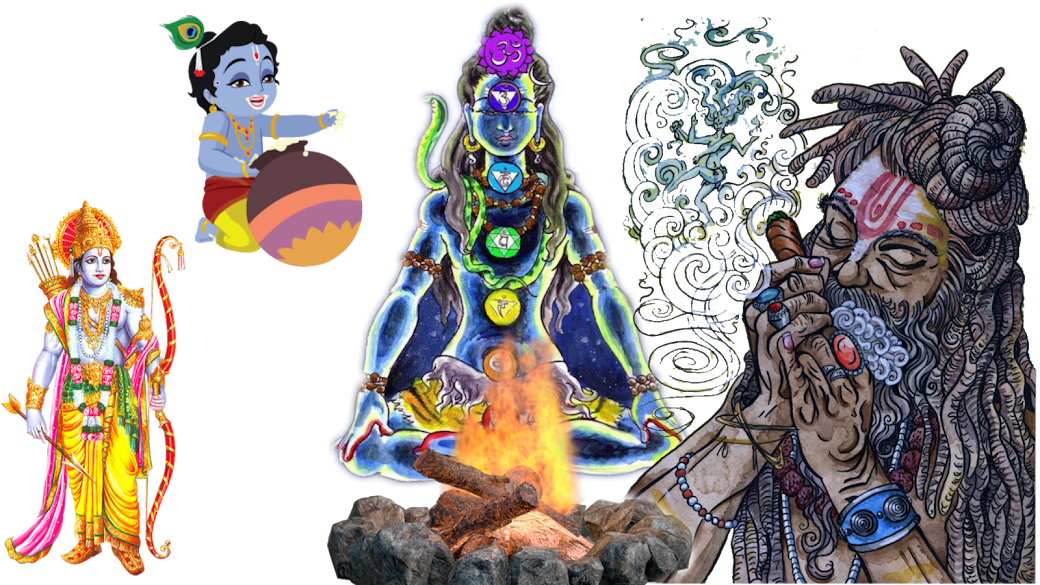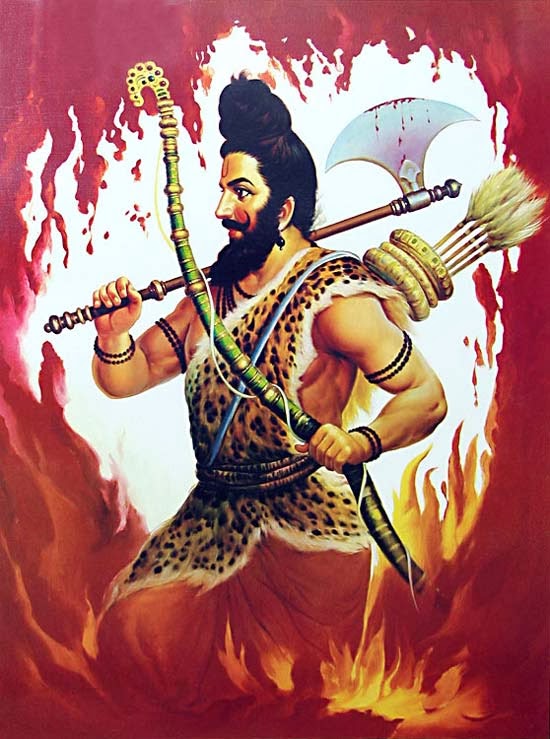Greatness of Lord Parasurama
Lord Parashurama
was the sixth avatar of Shri MahaVishnu born as the son of saptharishi Jamadagni. Though not revered and worshipped widely like that of other incarnations of Vishnu, Lord Parashurama played pivotal roles in the Indian Epical sequences of Mahabharata and Ramayana.
Lord Parasurama
Parasurama is seen wielding an axe – (parasu) and thus the name. He also had in his possession two of the most poweful bows in different times of his existence. They were Siva danush and Vishnu danush. Danush – meaning bow.
Influence in Ramayana
Parasurama had received the Siva danush from Lord Shiva who was impressed with his penance. This Siva danush was later given to King Janaka who put it to the open challenge of stringing it, the winner of whom will marry his daughter Sita devi. Lord Rama, the more supreme avatar of Lord Vishnu broke the Siva danush while trying to string it and thus won the challenge marrying Sita devi.
Lord Rama breaks Siva danush bow
Also Lord Parasurama knew that since the Siva danush was broken by Lord Rama, there remained only one other powerful bow – the Vishnu danush that would help him win over Ravana and rescue back his beloved Sita devi in the near future. By his divine powers, Parasurama knew of this and wanted to hand over the Vishnu danush to Lord Rama.
Parasurama challenges Lord Rama
So on his way back to Hastinapura, Rama was interrupted by Parasurama, who accused him as having broken the Siva danush which was earlier weakened by Lord Vishnu. So he challenged Lord Rama to see if he can do the same to the Vishnu danush that he had obtained from King Jamadagni.
Lord Rama strings the Vishnu danush with as much ease as he did with Siva danush, and calmly asks Lord Parasurama for a target to hit with the stringed bow.
Parasurama thus realises that both himself and Lord Rama were the supreme avatars of Lord Vishnu himself and thus departs leaving the Vishnu danush with Rama, admiring the mysterious plays of the supreme Lord.
It is with this Vishnu danush that Lord Rama finally slays down Ravana, the Rakshasha king and rescues his beloved wife.
Influence in Mahabharata
Parasurama has his influence in determining the outcome of the Kurukshetra war. Karna was a great warrior who sided with Duryodhana, the Kaurava king who fought against the Pandavas – who had the blessings and support of Lord Krishna.
Even Lord Krishna himself had doubts about Pandavas winning the war against Duryodhana who had the mighty warrior Karna by his side. Such was the might and battle skills of Karna.
Karna mistakenly outcast as a non Brahmana, lied to Lord Parasurama claiming him as a Brahmana so he could become a disciple and learn the weapon and battle skills.
Parasurama taught Karna the secrets of Brahmastra, which could assure definitive victory in battle for the ones who uses the weapon.
One day while Parasurama was resting on the lap of Karna, a poisonous bee stung Karna. But he kept calm bearing all the pain, not to disturb his resting guru. Parasurama awakened by the warm blood oozing out of the bee sting wound, realized that only a Kshatriya not a Brahmana can have such pain tolerance.
He was enraged for he had been lied to, and thus cursed Karna, that in the moment of great need, the knowledge of using the Brahmastra would be erased from his memory.
Lord Parasurama resting on Karna’s lap while a bee stings Karna
This curse proved pivotal in the battle of Kurukshetra, as Karna would have had definitive victory against the Pandavas and Lord Krishna if he hadn’t forgotten the Brahmastra tactics at the battle field.














.jpg)
.jpg)
.jpg)
.jpg)














No comments:
Post a Comment